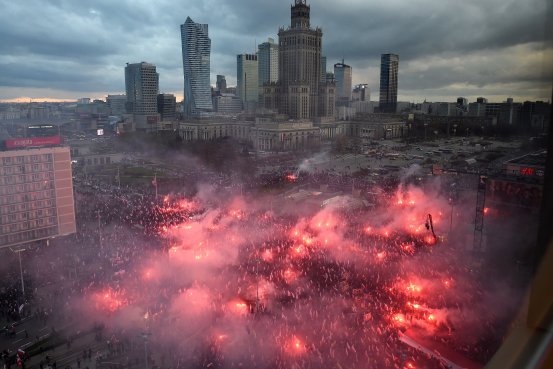Saturday 11 November banners that read “Europe Will Be White” and “Clean Blood” were shown by a large number of marchers who celebrated Polish Independence Day in Warsaw demanding a Poland free from Jews and Muslims.
Irene Guidarelli of the Global Committee for the Rule of Law asked a comment to the former President of the Polish Constitutional Tribunal professor Andrzej Rzepliński – previousley interviewed on 13 December 2016 by Matteo Angioli for Radio Radicale – who said that: “It is a shame that the police did not react to the content of aggressive racist inscriptions on banners or the aggressive behavior of marching fascists”.
On 9 November the American Embassy in Warsaw isued the following security message for U.S. citizen: “The Embassy reminds U.S. citizens that even demonstrations intended to be peaceful can be unpredictable and may escalate into violence. U.S. citizens are advised to avoid the areas of these demonstrations and exercise caution if in the vicinity of any demonstrations or protests. Be alert and aware of your surroundings and monitor the local news media for the most current information”.
Given the relevance, we propose an extract of Polish Nationalist Youth March Draws Thousands in Capital an article by Drew Hinshaw for the Wall Street Journal.
« Some of the marchers flew in from Hungary, Slovakia and Spain and waved flags and symbols that those countries used during their wartime collaboration with Nazi Germany. A number of people in the crowd said they didn’t belong to any neo-fascist or racist organization but didn’t see a problem with the overall tone of what has become Poland’s biggest independence day event. The march, organized by a group called the “National Radical Camp”, underscores the rightward politics of a growing section of Polish youth. The Radical Camp presents itself as the heir to a 1930s fascist movement of the same name, which fought to rid Poland of Jews in the years just before the Holocaust.
Officials in the city government said they thought the march reflected poorly on Poland, but they said they had no choice but to approve the demonstration, as it fulfilled the legal requirements: It qualified as a celebration of Polish history. The Radical Camp has been holding independence-day marches since 2009. Until several years ago, it struggled to attract more than a few hundred people. “This march is just an expression of a bigger social phenomenon, which is definitely very troubling, and is the growing acceptance of extreme nationalism and xenophobia among young people in Poland,” said Rafal Pankowski, a political-science professor at private University Collegium Civitas in Warsaw. Some Poles on Facebook and Twitter said they were staying away from the city center on their country’s independence day, to avoid potential violence.
Similar movements have taken hold – even captured seats in parliament – in Hungary, Slovakia and Czech Republic. Some of these countries are among Europe’s most prospering. Poland is the only country in the EU that didn’t experience a single quarter of economic contraction after the financial crisis. On Saturday, Polish state television called the procession a “great march of patriots”.
“It’s like this inner need we have,” said Lukasz, a 24-year-old protester. “We want a Poland that will be for Polish people.” »

